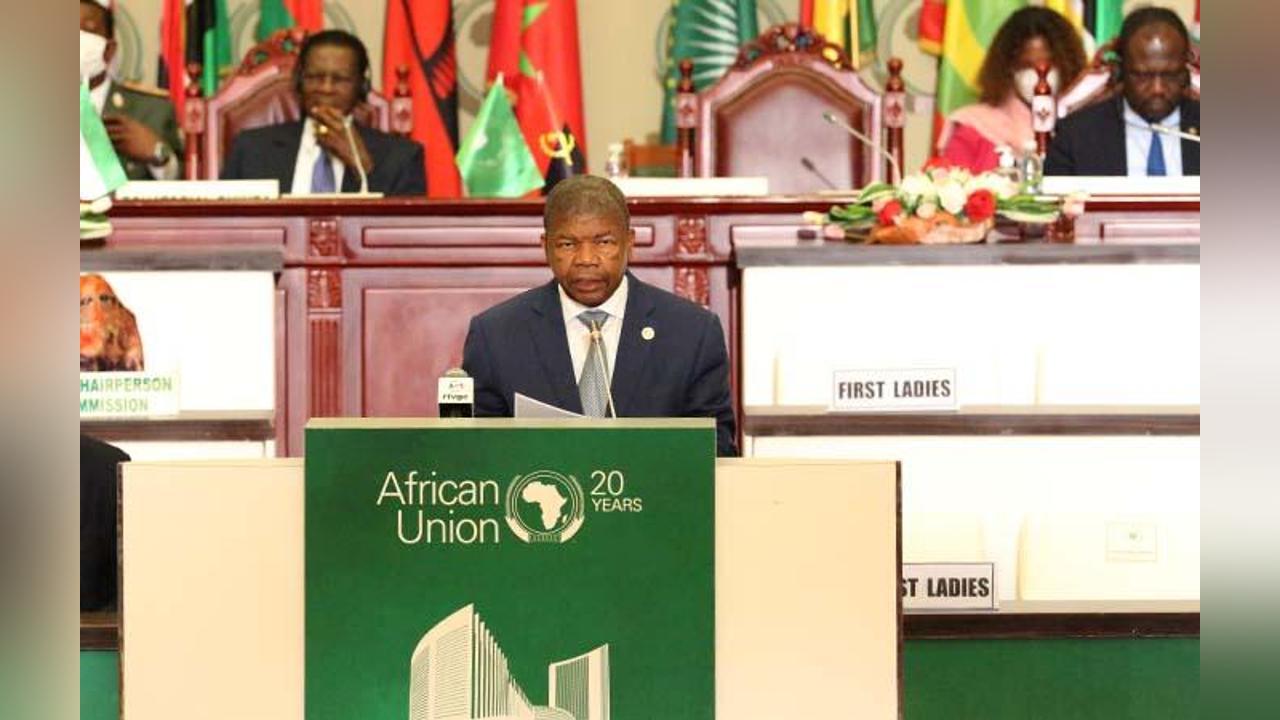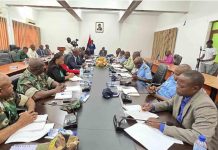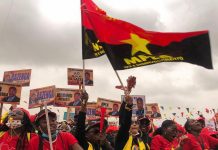Africa-Press – Angola. On the eve of another anniversary of the creation of the Organization of African Unity (May 25), currently the African Union, several assumptions remain alive for the integrated development of the continent.
Among these purposes, they point out “The Silence of Arms in Africa”, “African Solutions to African Problems” and “The Africa We Want”, this, moreover, the most resounding slogan of “Agenda 2063”.
This document, launched by the African Union in April 2015 in Niamey (Niger), contemplates, among other aspects, political integration, prosperity – based on inclusive growth and sustainable development – union – according to the ideals of Pan-Africanism – democracy , good governance, human rights and peace and security.
Understood as an “endogenous plan for transformation”, Agenda 2063 aims to make Africa a global power of the future.
Among the Pan-Africanist leaders who believe in the project is the Angolan Head of State, João Lourenço, who, during the 16th AU Summit on “Terrorism and Unconstitutional Changes of Governments in Africa”, in Malabo, Equatorial Guinea, on 28 May 2022 , was named “AU Champion for Peace and Reconciliation in Africa”.
The fact that his peers were convinced that the experience of resolving a long war in Angola (which ended in April 2002) and the successful process of National Reconciliation, embraced by Angolans, could also catalyze the silencing of weapons in different regions of the continent, and the end of conflicts.
This title, as he insisted on stating on one occasion, gives him “increased responsibilities to promote actions and initiatives that contribute to strengthening understanding and national reconciliation on the continent”, the scene of numerous internal armed conflicts and between countries. neighbors.
As promised by João Lourenço, Angola will spare no effort in contributing to continental peace, however he warns that the end of conflicts and the definitive silencing of weapons in Africa will only be possible with the engagement of each of the States, countries, governments and mainland populations.
In addition to these actors are the so-called CERs, namely the Community of Sahel-Saharan States (CEN-SAD), Common Market for Eastern and Southern Africa (COMESA), East African Community (EAC), Economic Community of Central African States (ECCAS), Economic Community of West African States (ECOWAS), Intergovernmental Authority on Development (IGAD), Southern African Development Community (SADC) and the Arab Maghreb Union (UMA).
These RECs (Regional Economic Communities) constitute, in turn, other “players” of paramount importance for the prevention, management and resolution of conflicts, which are the Regional Mechanisms, supported by the Peace and Security Council of the African Union.
Examples include the International Conference on the Great Lakes Region (CIRGL), the African Union Transition Mission in Somalia (ATMIS), the North Africa Regional Capacity (NARC), the Multinational Joint Task Force (MNJTF) , the G5 Sahel and the SADC Standby Force.
It is in this universe that, focused on strategic engagement in matters of defense and security, Angolan diplomacy continues to focus on the negotiated and peaceful resolution of conflicts in Africa, in particular, and in the world, in general.
In this light, the Angolan Head of State’s “Specifications” as Champion of the AU for Peace and Reconciliation in Africa, includes the conflict in the East of the DRC, with neighboring Rwanda – of which he is a mediator – terrorism in Mozambique and in the Horn of Africa, the situation of insecurity in the Sahel region, among other crises.
Regarding this area, which includes Chad, Guinea, Burkina Faso, Mali and Libya, although cautious, especially for the last two, João Lourenço says he is hopeful and encouraged in a positive outcome, due to some signs registered in the scope of transition processes, leading to democratic normality.
With regard to the fight against terrorism in Mozambique, it should be noted that Angola has extended its mission in the SADC State of Alert Force, which operates in Cabo Delgado.
Added to those concerns is the issue of unconstitutional changes, against which the Angolan statesman advocates a “vigorous reaction, based on a zero tolerance policy” against agents and authorities emerging from coups d’état.
Recently, it has shown that it is also not outside its scope to convince the belligerents of the Sudanese Armed Forces (SAF) and the Rapid Support Forces (RSF) to reach a ceasefire and negotiate an end to the war that broke out on 15 April, derailing the transition to civilian rule.
In this sense, in early May, he telephoned the leader of the Sovereign Council of Sudan, General Abdel Fatah Al Burhan, encouraging the disputing parties to reach a ceasefire.
The champion of the AU certainly does not intend to resign from his initiatives in favor of pacification in the Central African Republic, with a view to persuading the leaders of the various armed groups operating in the country, to abandon the rebellion.
Such initiatives, along with other regional ones, led to the adoption of the Joint Roadmap for Peace in the CAR better known as “Roteiro de Luanda”, in favor of a ceasefire and Disarmament, Demobilization, Reintegration and Repatriation (DDRR).
With regard to maritime piracy, mainly in the Gulf of Guinea, the AU Champion for Peace and Reconciliation in Africa advocates that it be seen at the same level and degree of concern relative to other conflicts.
Pan-African Forum for a Culture of Peace in Africa – Bienal de Luanda
Another reason responsible for strengthening diplomatic credibility on reconciliation, peace and security undoubtedly has to do with the commitment assumed by Angola to host, every two years, the “Pan-African Forum for the Culture of Peace in Africa – Luanda Biennial”.
Meanwhile, on the eve of the 2nd edition (2021), the 34th AU Summit adopted, without reservation, a Decision that supported the Angolan Executive in promoting a culture of peace, urging that this be practiced by all Member States.
It was understood, at the time, that the Bienal de Luanda, as a privileged space for the promotion of cultural diversity and African unity, constitutes a unique platform for governments, civil society, the artistic and scientific community, the private sector and international organizations to discuss and define strategies for the prevention of violence and conflict with a view to building lasting peace in Africa.
In practical terms, the Bienal de Luanda took shape when, on December 18, 2018, the Government of Angola and UNESCO signed an agreement to co-host the 1st edition of the event, in September 2019, together with the African Union. , a partnership that is repeated every two years.
The holding, this year, of the 3rd edition of the “Luanda Biennial” is yet another testament to the diplomatic commitment of Angola and its leader, João Lourenço, aligned with the pan-African movement for a culture of peace and non-violence. -violence in Africa.
The regularity of the event is yet another unequivocal proof of the serious commitment of Angola and its president in promoting “an integrated, prosperous and peaceful Africa, driven by its own citizens”, as reflected in Agenda 2063.
It goes without saying that, after six decades, these political, social and economic assumptions remain key concerns on the agenda of African leaders, in particular the President of Angola, João Lourenço.
This is certainly the attitude that the peoples of Africa expect from their leaders, who are required to have permanent respect for the principles of transparency and good governance.
“Agenda 2063” is therefore an essential instrument for the affirmation of Africa, but it is understood that its implementation will only be a fact if there is political will.
For More News And Analysis About Angola Follow Africa-Press






